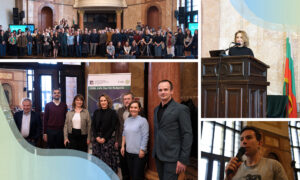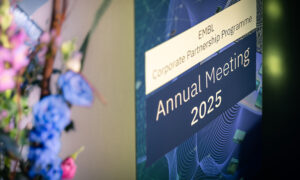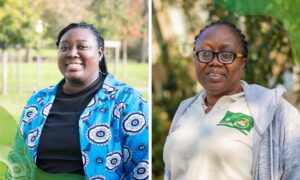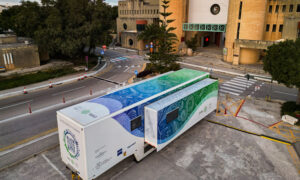
Spanish dignitaries meet EMBL leaders to uplift cooperation for future research synergy
Spanish State Secretary for Research, Innovation, and Universities, Juan Cruz Cigudosa, and Secretary General for Research, Eva Ortega, visited EMBL headquarters in Heidelberg to discuss its collaboration with Spain and the future of European science

This week, a delegation from the Spanish Ministry of Science, Innovation, and Universities visited EMBL headquarters in Heidelberg to strengthen ties and discuss future cooperation between Spain and EMBL. Hosted by Director General Edith Heard and the Head of International Relations Plamena Markova, State Secretary Cigudosa visited EMBL Heidelberg on 9 September 2024, accompanied by Eva Ortega, Spain’s Secretary General for Research and Ignacio Baanante, the Spanish Council Delegate at EMBL.
The discussions revolved around the collaborations established during the current programme, and the extensive network of collaborative ties that EMBL has cemented with prestigious Spanish research-performing organisations, which can be further amplified in areas of mutual interest such as AI technologies applied to advanced basic research.
“Spain is going to strengthen its leadership in EMBL, as it will enhance Spanish participation in this international organisation, particularly in the site of this laboratory in our country,” said Juan Cruz Cigudosa, Spanish Secretary of State for Science, Innovation, and Universities at the Ministry of Science, Innovation, and Universities.
The visit comes on the heels of EMBL completing the sampling phase of its unique Traversing European Coastlines (TREC) expedition that studied 120 land-sea transects in over 20 European countries. TREC had an extensive presence across the Iberian peninsula, with a total of six stops in Spain, including two superstops in Bilbao and Barcelona, where EMBL, its partners, and local hosts capitalised on the occasion to engage with Spanish political stakeholders and the scientific community. In particular, the month-long TREC expedition stop in Bilbao was a key event, which took place under the auspices of the Spanish EU presidency to the EU Council. The TREC fieldwork will result in discoveries that cross scientific disciplines and many potential spill-over collaborations with Spanish institutes in the future.
“It was a pleasure to see the EMBL facilities in Heidelberg first-hand, and to be able to see the scientific excellence that is carried out in this Laboratory, thanks to its Director General Edith Heard, her team, and the entire Spanish scientific diaspora who accompanied us on the visit,” said Ortega, Spanish Secretary General for Research at the Ministry of Science, Innovation, and Universities.
Naturally, the discussion also focused on the impressive performance of EMBL’s site in Spain. Founded in 2017, EMBL Barcelona may be EMBL’s newest site, but in just a few years it became a recognised hub of excellence in the field of tissue biology and disease modelling. Its world-class technology and experts, coupled with a demonstrated role as nexus to other scientific disciplines, is helping take European research to the upper level – adding significantly to the scientific landscape in Spain and beyond.
“EMBL Barcelona has evolved into a vibrant place of scientific excellence, integrating into Spain’s rich research ecosystem. One of the things that excites me most is how we are building bridges across disciplines and institutions, both within Spain and internationally,” said James Sharpe, Head of EMBL Barcelona.
Additionally, the guests toured Alba Diz-Muñoz’s lab, which explores how mechanical properties affect the way immune cells or other cells move and got acquainted with the scientific work of Spanish Group Leaders at EMBL-EBI in Hinxton, EMBL Barcelona, and EMBL Grenoble.
“Since my arrival in 2016, I have been able to tap into EMBL’s tools and range of experts to advance my own research,” Diz-Muñoz, Group Leader at EMBL Heidelberg, said. “So, it was good to be able to show the work I’ve been doing and how, even outside of Spain and the Barcelona site, EMBL makes a difference to what Spanish scientists can achieve.”
The Spanish delegation also informally met with the wider Spanish community currently at EMBL Heidelberg. Both the State Secretary and Secretary General engaged extensively with a group of EMBL staff about their careers, fields of study, and why EMBL was their choice of institution.
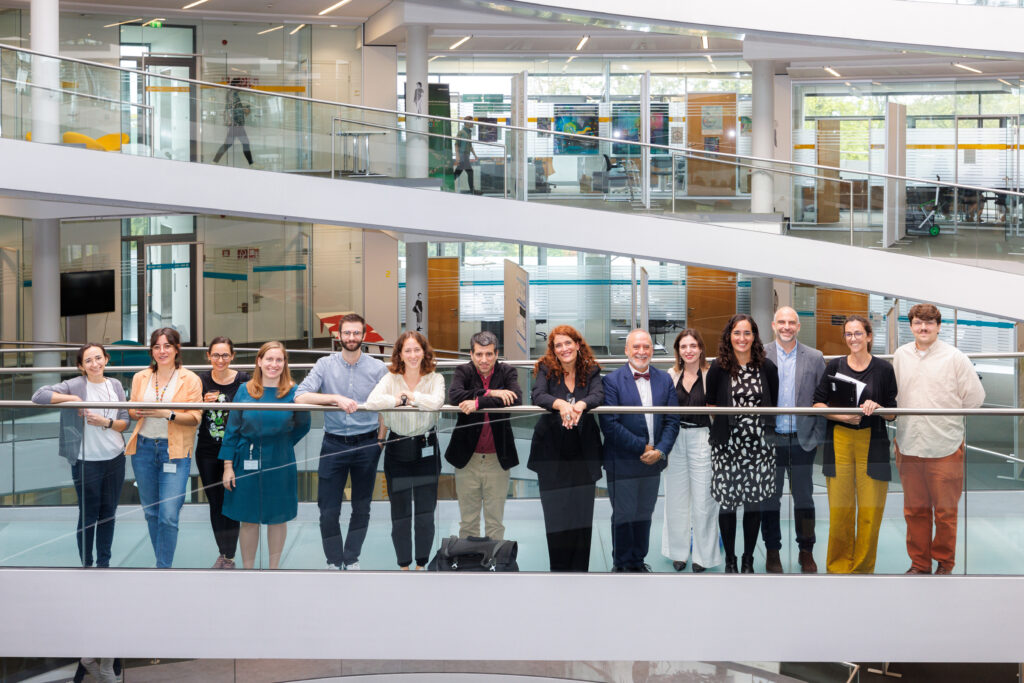
The visit included a tour of the EMBL Imaging Centre, with its cutting-edge instrumentation and microscopy technologies, and the World of Molecular Biology – EMBL’s interactive exhibition co-located there.
“The event marked not only the recognition of EMBL’s fruitful collaboration with Spain, but also the beginning of many new significant steps to push the boundaries of science and progress,” said Edith Heard, Director General of EMBL. “The talks about the future and EMBL’s strategic forward look have indeed been instrumental in underlining new areas of cooperation and alignment with Spain’s research priorities. To this end, the Ministry’s support for the site in Barcelona as well as the research conducted there has been critical. EMBL is grateful and ready to further strengthen its collaborative ties in Spain.”
